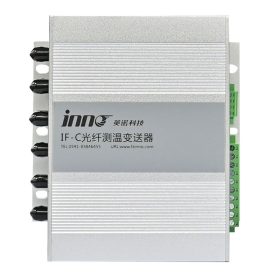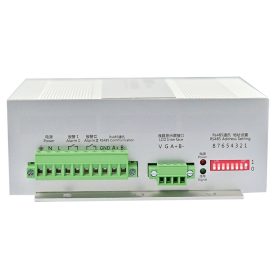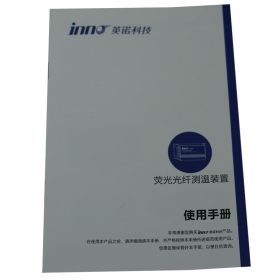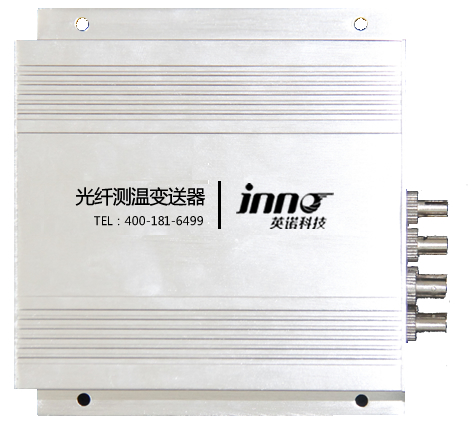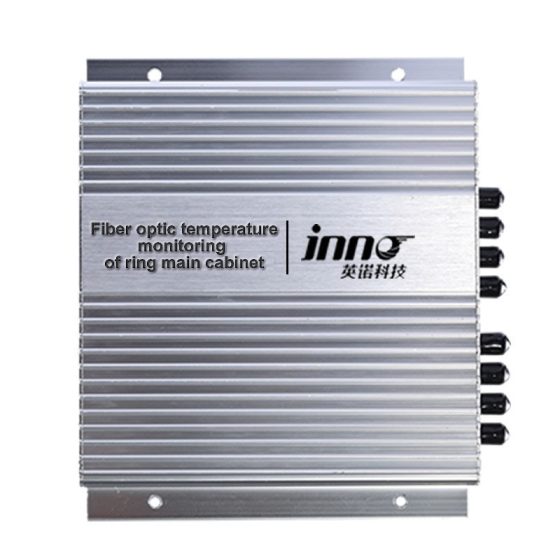Maama tiupi filo optic e ʻea, with customized number of temperature measurement channels according to customer needs, resistant to electromagnetic interference, especially used for temperature monitoring in power environments, such as switchgear temperature measurement, transformer winding temperature measurement, medical environment temperature measurement, experimental environment temperature monitoring, mo e alā meʻa pe.
Fluorescent fiber optic temperature transmitter is a multi-channel fiber optic temperature measurement device. The temperature measurement channel can be expanded according to needs, and a standard RS485 communication interface can be provided to remotely transmit temperature information to the background and record and store temperature data. It is specially developed for real-time online temperature monitoring of power switchgear and ring main cabinets. Its internal modular integrated design allows for flexible installation and channel configuration, and can be externally connected to InnoTech standard LCD display instruments.
Functional characteristics
1、Separate design from LCD display for easy selection and matching
2、Provide dual RS485 communication interfaces
3、Integrated multi in one fiber optic module provides two sets of switch output functions
4、DIP switch settings for easy networking
| General functions |
1. Relay capacity: 5A/250VAC;
2. The over temperature alarm 1 value is 80 ° C. When the detected temperature is ≥ the over temperature alarm 1 value+0.1 ℃, the alarm I output contact will close; When the detection temperature is ≤ over temperature alarm 1 value -3.0 ° C, the output contact of Alarm I is disconnected;
3. The over temperature alarm 2 value is 120 ° C. When the detected temperature is ≥ the over temperature alarm 2 value+0.1 ℃, the alarm II output contact will close; When the detection temperature is ≤ over temperature alarm 2 value -3.0 ° C, the output contact of Alarm II is disconnected;
4. E (analog current) ngaue: corresponding to 0-200 ° C, with a range of 4-20mA (conventional) or 0-20mA;
5. Ngaahi fua ʻi tuʻa – B transmitter (16 ngaahi senolo) can achieve 12 current output functions; (Other transmitters cannot achieve this)
6. F adds RS485/232 serial communication function (standard configuration); |
| Special functions |
1. V (analog voltage) ngaue: corresponding to 0~200 ℃, with a range of 0~10V (customizable within this range); Ngaahi fua ʻi tuʻa – B-type transmitter (16 ngaahi senolo) can achieve 12 voltage output functions; (Other transmitters cannot achieve this)
2. Transmission power supply DC9-18V, DC19-36V;
3. E and V functions exceed 12 outputs;
4. Ngaahi fua ʻi tuʻa – C and E, temperature measurement requirements for transmitters with 16 or more channels;
5. Temperature measurement range exceeds -30 °C ki he 200 ° C;
6. Labeling requirements;
7. The temperature measurement accuracy error is within 1 ° C;
8. Ethernet communication function; |
Fokotuʻutuʻu ʻo e tohi kole
Fakapatonu ʻa e ngaahi founga ke fakaleleiʻi ʻaki hoʻo ngaue,
ʻOku mau ʻoatu ʻa e kautaha meʻangaue totonu (OFETUKU) ngaahi founga fakaleleiʻi ʻi he ngaahi maketi kehekehe,
ʻOku fakafalala ʻa e ngaahi maketi ko ʻeni ki he tuʻunga lelei, fale tauhiʻanga ʻo e fanga, mo fokotuʻutuʻu fakalelei ʻa e ngaahi tekinolosia ʻoku fakafeʻunga ki heʻenau ngaahi ngaueʻanga.
Ko e foʻi lea ko e totongi: ʻOku tau tali TT,30% tipōsiti mo e 70% palanisi ki he tatau ʻo e BL.
Ko e taimi ʻoku ʻomi ai: Ko e angamaheni ʻe fie maʻu 15-20 ngaahi ʻahó.
Ko e tuʻunga ʻo e kofukofu: Faʻa fakaʻaongaʻi ʻa e palaiuti malohi ke maluʻi.
Ko e fakaʻilonga: lf ʻoku ke maʻu ha lahi lelei, ʻOku ʻikai ko ha palopalema ia ke fai ʻa e O.
Ko ʻetau maketi: ʻOku manakoa ʻetau koloa ʻi ʻInitonesia, ʻOtu Filipainí, Lūsia, USA, Hahake Lotoloto pea vave ni pe. Ko e niʻihi ʻo kinautolu ko ʻetau kau fakatau angamaheni pea ko e niʻihi ʻo kinautolu ʻoku nau fakatupulaki. ʻOku mau ʻamanaki te mou lava ʻo ʻai ke ʻaonga kiate kimautolu ʻa e Mutuale mei heʻemau ngaue fakataha..
Maluʻí: ʻi he 12 mahina talu mei he ʻaho BL.
ʻOku tokoni ʻa e tali vave ʻi he kimuʻa ʻi he vahaʻataimi fakatau ke ke maʻu ha ʻota.
Tokoni fakaʻofoʻofa ʻi he taimi ʻoku ngaohi ai ke ke ʻiloʻi ʻa e sitepu takitaha naʻa tau fai.
ʻOku fakaleleiʻi koe ʻe he ʻulungaanga falalaʻanga hili hono fakatau atu e langa ʻulu.
ʻOku fakapapauʻi ʻe he maluʻi lelei ʻo e vahaʻataimi loloa te ke lava ʻo fakatau taʻe toe momou.
1. ʻOku taʻofi ʻe ha taha ʻa e fakatau fakaemamani lahi.
2. Mahulu hake ʻi he 13 ngaahi taukei fakapalofesinale ʻi he ngaahi meʻangaue fakaʻuhila.
3. ʻOku mau ʻoatu ha tokoni fakatekinolosia fakapalofesinale ʻi he ʻInitaneti ki hono fakahaohaoaʻi hoʻo founga fakaʻuhila
4. Taukei ʻi he ngaue tokoni mo e fokotuʻu.
5. Ko e ngaahi koloa kotoa pe ʻoku ʻi ai e ngaahi naunau ʻi he malumalu ʻo e mapuleʻi lelei mo e sivi fakaʻosi kimuʻa pea toki fakafolau atu.
6. Te tau lava ʻo fakapapauʻi ʻa e mahuʻinga ʻo e feʻauʻauhi mo e ngaahi koloa lelei falalaʻanga.
7. Ko e lahi taha ʻo e ngaahi vaka feʻauʻauhi mei heʻetau fakafolau atu forwarder.
8. Fakapapauʻi ʻo e maluʻi: 12 māhina
9.Ko e ha pe ha meʻa lahi pe siʻisiʻi, te mau lava ʻo ʻoatu ha ngaue tokoni fakatāutaha!
 ʻIkai ha kalava optic e mafana ʻo e ʻea ,founga vakaiʻi ʻo e māfana ʻo e ʻeá.
ʻIkai ha kalava optic e mafana ʻo e ʻea ,founga vakaiʻi ʻo e māfana ʻo e ʻeá.



